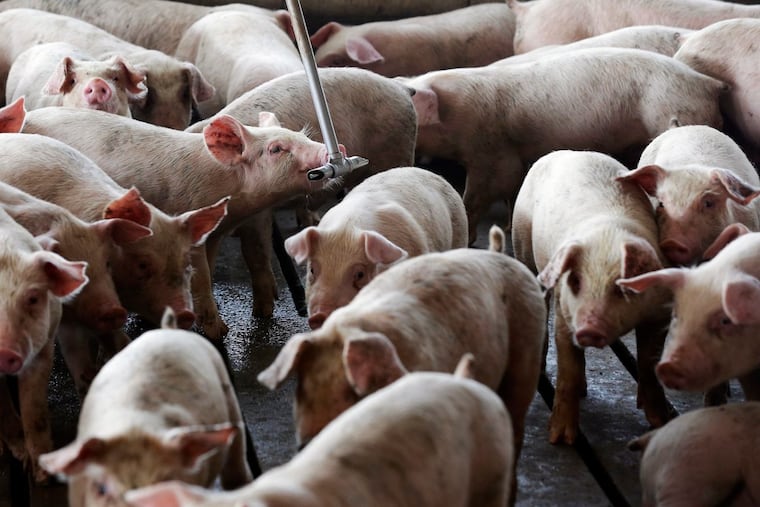Pa.'s booming hog industry could be hit by China's retaliatory tariff
What so many Pennsylvania farmers feared has come to pass: China has announced it is imposing tariffs on 128 U.S. products, including pork. The tariffs are in retaliation for the Trump administration's announcement in March that it was imposing tariffs on steel imports.

In 2000, Pennsylvania was an also-ran when it came to hog farming, producing only about 18 million pounds for export and ranking 43rd among the states.
But by 2016, pork production in the commonwealth had skyrocketed to 82 million pounds — climbing to 13th.
Now, what many Pennsylvania farmers were wary of has come to pass.
China has announced it is imposing tariffs on 128 U.S. products — including pork — in retaliation for the Trump administration's announcement in March that it was imposing tariffs on steel and aluminum. U.S. farmers feared that retaliation by China would hit agriculture.
"The short answer is, yes, there is concern," said Chris Herr, a spokesman for the Pennsylvania Pork Producers Council, a trade association. "There's been concern among many areas of agriculture in Pennsylvania since the president has focused on this trade discussion. … In Pennsylvania, 75 percent of our agriculture happens to be animal agriculture. Both pork and poultry have been growing."
Montgomery County is a major pork producer and includes both the Hatfield Quality Meats brand, owned by the Clemens Group, and the Leidy's and Alderfer brands, owned by the ALL Holding Co. Representatives from Clemens and ALL could not be reached immediately for comment.
Herr said the impact remains to be seen. He said that there is a glut of pork in China and that sales had been waning.
Mark O'Neill, a spokesman for the Pennsylvania Farm Bureau, said Pennsylvania has 1,072 hog farms that generate $331.5 million in sales each year.
In additional, Pennsylvania's pork industry generates $67.5 million in export income each year. And, it has been creating 1,600 export jobs annually, according to the Pennsylvania Pork Producers Council.
And, unlike some agricultural products that are concentrated in a few counties, pork production is present throughout the commonwealth.
So, China's sudden imposition of a 25 percent tariff on U.S. pork makes farmers nervous — especially in a state that voted for Trump in 2016.
"In general, yes, it is another area of concern for Pennsylvania and American farmers," O'Neill said.
O'Neill said tariffs give other countries a competitive edge that could be damaging over the long term.
"They can just start buying from other nations," O'Neill said of China. "It is a real concern for our farmers."
Overall, China under President Xi Jinping said it was raising import duties on a $3 billion list that included U.S. pork, apples, and other products in the escalating trade dispute with Washington.
The Trump administration said it imposed a tariff on steel and aluminum in response to China's state-led economic model that hampers access to its markets. The administration says China protects its companies and subsidizes exports in violation of Beijing's free-trade commitments.
Overall, the outcome of China's new tariffs is uncertain on pork and other agricultural products. Forecasters said they believe that the impact should be limited, but worry that an international trade war could set back a growing global recovery.